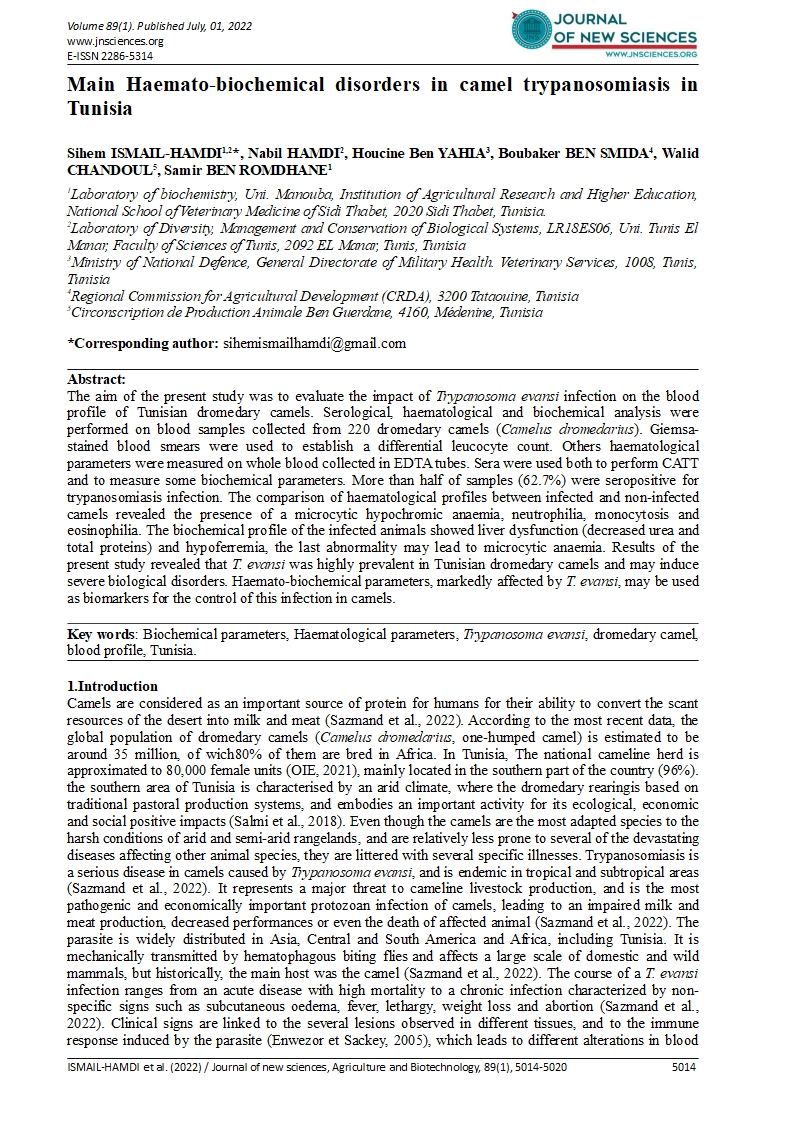

- Category: Volume 89
- Hits: 1116
Main Haemato-biochemical disorders in camel trypanosomiasis in Tunisia
Sihem ISMAIL-HAMDI1,2
Nabil HAMDI
Houcine Ben YAHIA3
Boubaker BEN SMIDA4
Walid CHANDOUL5
Samir BEN ROMDHANE1
1Laboratory of biochemistry, Uni. Manouba, Institution of Agricultural Research and Higher Education, National School of Veterinary Medicine of Sidi Thabet, 2020 Sidi Thabet, Tunisia.
2Laboratory of Diversity, Management and Conservation of Biological Systems, LR18ES06, Uni. Tunis El Manar, Faculty of Sciences of Tunis, 2092 EL Manar, Tunis, Tunisia
3Ministry of National Defence, General Directorate of Military Health. Veterinary Services, 1008, Tunis, Tunisia
4Regional Commission for Agricultural Development (CRDA), 3200 Tataouine, Tunisia
5Circonscription de Production Animale Ben Guerdane, 4160, Médenine, Tunisia
DOI: https://doi.org/10.55416/sunb.jns01.2207.08901
Abstract: The aim of the present study was to evaluate the impact of Trypanosoma evansi infection on the blood profile of Tunisian dromedary camels. Serological, haematological and biochemical analysis were performed on blood samples collected from 220 dromedary camels (Camelus dromedarius). Giemsa-stained blood smears were used to establish a differential leucocyte count. Others haematological parameters were measured on whole blood collected in EDTA tubes. Sera were used both to perform CATT and to measure some biochemical parameters. More than half of samples (62.7%) were seropositive for trypanosomiasis infection. The comparison of haematological profiles between infected and non-infected camels revealed the presence of a microcytic hypochromic anaemia, neutrophilia, monocytosis and eosinophilia. The biochemical profile of the infected animals showed liver dysfunction (decreased urea and total proteins) and hypoferremia, the last abnormality may lead to microcytic anaemia. Results of the present study revealed that T. evansi was highly prevalent in Tunisian dromedary camels and may induce severe biological disorders. Haemato-biochemical parameters, markedly affected by T. evansi, may be used as biomarkers for the control of this infection in camels.
Key words: Biochemical parameters, Haematological parameters, Trypanosoma evansi, dromedary camel, blood profile, Tunisia

